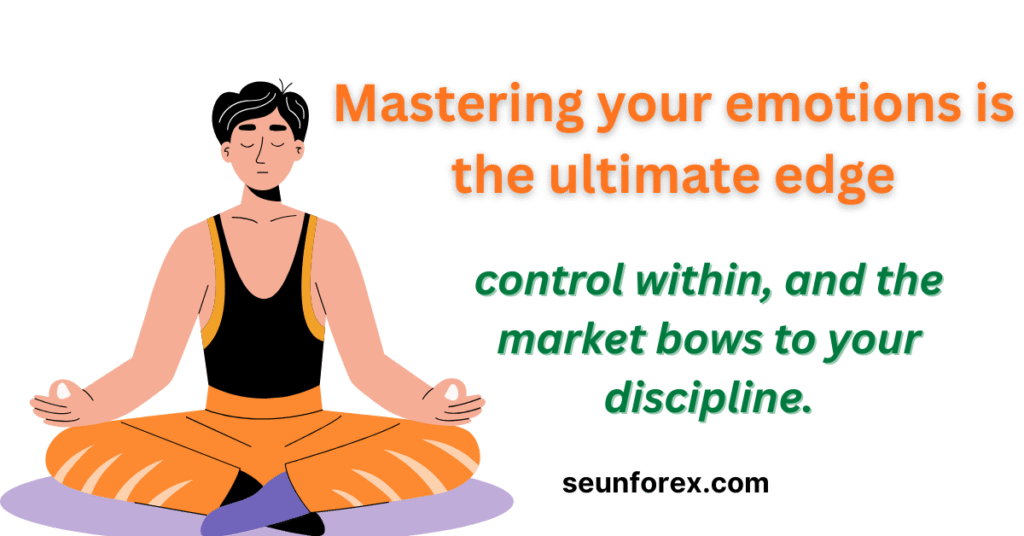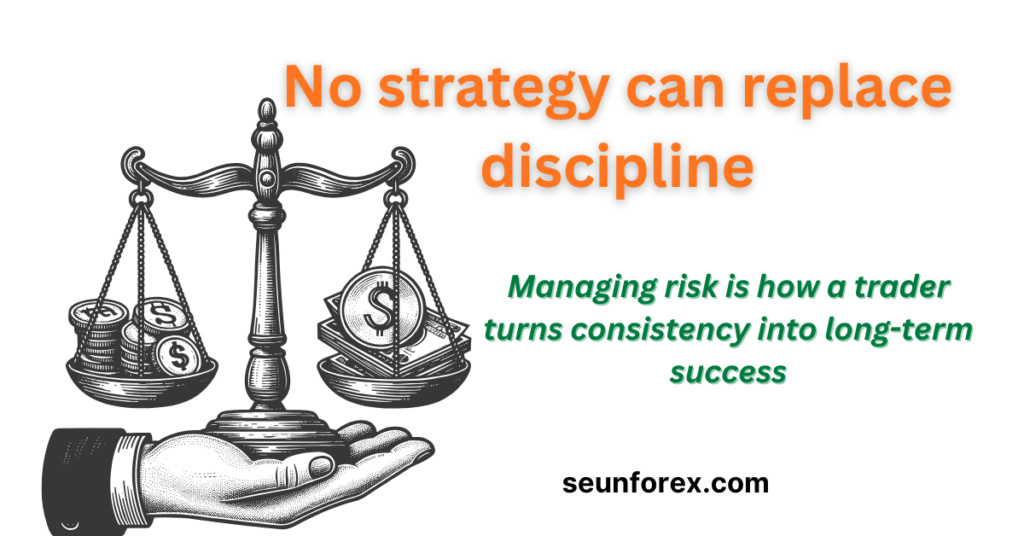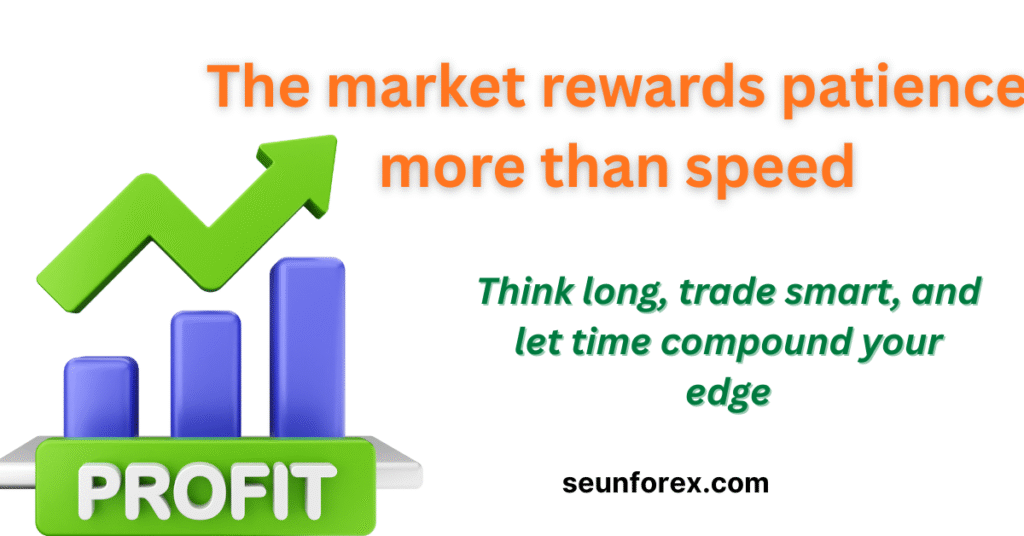
Introduction: The Silent Edge That Defines Success in Trading
Why do most traders fail?
The psychology of trading discipline is the single biggest factor that separates consistent winners from struggling traders. It’s not because they don’t know how to draw support and resistance. It’s not because they lack indicators, trading systems, or even access to market news. It’s because they lack discipline.
According to multiple trading psychology studies, nearly 90% of retail traders lose money in the long run. But if you look deeper, you’ll see a striking pattern: most of those losses have less to do with strategy and more to do with mindset. Traders often know exactly what to do—but when real money is on the line, emotions take over.
The truth is, discipline is the bridge between knowledge and consistent profits. Without mastering the psychology of trading discipline, even the best trading system will eventually collapse under the weight of impulsive decisions.
In this guide, we’re going to peel back the curtain on the secrets of top traders—the five hidden principles of discipline, psychology, and self-mastery that separate them from everyone else.
By the end of this article, you won’t just understand trading discipline strategies. You’ll know how to build them, live them, and make discipline your ultimate trading edge.
Chapter 1: Why Trading Discipline Matters
Strategy vs. Discipline
Think of trading like professional sports. Every basketball player knows how to shoot, dribble, and defend. But only a few become NBA legends. Why? Not because they “know more plays,” but because they stick to fundamentals under pressure.
Trading works the same way. Most traders know they should cut losses quickly, let winners run, and avoid over-leveraging. But when greed and fear enter the picture, discipline evaporates.
The Emotions That Destroy Traders
- Fear: Closing trades too early or avoiding good setups.
- Greed: Overleveraging, chasing profits, ignoring stop-losses.
- Overconfidence: Winning a few trades, then believing the market can’t touch you.
- Revenge Trading: Trying to win back losses immediately, leading to even bigger losses.
Every failed trading account has traces of these emotional patterns.
The Science of Discipline
Discipline is not about willpower alone. It’s about building habits and systems that make good decisions automatic. Research in behavioral finance shows that stress triggers the brain’s amygdala (fear center), which overrides logical thinking. This is why traders who don’t prepare mentally often sabotage themselves.
💡 Internal Resource: If you’ve struggled with greed in your trades, read this next → Overcome Greed in Trading with Psychology.
Chapter 2: Secret #1 – Master Emotional Regulation

The first secret of top traders is not about charts or price action. It’s about controlling their inner world.
How Emotions Hijack Trading
- Dopamine: When you win a trade, your brain gets a chemical high. This encourages riskier behavior to chase the same “rush.”
- Cortisol: When you lose, stress hormones flood your system, making you panic or freeze.
- Together, these chemicals create a cycle of boom and bust.
Real Example: Paul Tudor Jones
Jones is one of the most successful hedge fund managers alive. His strength? Emotional detachment. He once said: “Don’t be a hero. Don’t have an ego. Always question yourself and your ability.”
He mastered emotions not by being fearless, but by recognizing fear early and respecting it.
Practical Tools for Emotional Control
- Mindfulness Practice – A simple 5-minute breathing routine before trading can lower cortisol and improve decision-making.
- Trading Journal – Write down emotions felt during each trade. Over time, you’ll notice patterns like “I always overtrade after a loss.”
- Pause Button – Force yourself to take a 5-minute break after closing any trade, win or lose. This resets emotional impulses.
Top traders know: you can’t control the market, but you can control your response to it.
Chapter 3: Secret #2 – Build Rigid Routines and Habits
Discipline is not built in the heat of trading—it’s built in your daily routine.
The Power of Routines
Every decision you make drains mental energy. If your trading is full of “random” choices, you’ll run out of discipline fast. But when you have routines, discipline becomes automatic.
Example: Mark Minervini
The U.S. Investing Champion is famous for his strict preparation. He studies hundreds of charts every evening, ranks setups, and creates a trading plan. By the time the market opens, he’s not guessing—he’s executing.
A Sample Trader’s Routine
- Morning (Pre-market)
- Review economic calendar.
- Check overnight news (without obsessing).
- Journal current emotional state.
- During Trading
- Only take setups that match pre-defined rules.
- Avoid distractions (no social media while trading).
- After Trading
- Record every trade: entry, exit, reason, emotions.
- Rate discipline, not just profit/loss.
Over time, these small habits create massive consistency.
Chapter 4: Secret #3 – Risk Management as Discipline

If there is one area where traders sabotage themselves most, it’s risk.
The Psychology of Risk
Humans are wired to hate losing more than they love winning (a bias known as loss aversion). That’s why traders often risk too much—they believe “this trade must work.”
But risk is not about being right. It’s about staying alive long enough to be profitable in the long run.
How Top Traders Manage Risk
- Position Sizing: Never risk more than 1–2% of your capital per trade.
- Stop Losses: Accept small losses as “business expenses.”
- Drawdown Control: Some prop firms enforce this through daily loss limits. Smart traders adopt the same mindset.
Real Example: Ed Seykota
Seykota, a legendary trader, famously said: “The elements of good trading are: (1) cutting losses, (2) cutting losses, and (3) cutting losses.”
He wasn’t joking. Most traders blow accounts not because they can’t find winners, but because they refuse to cut losers. This is where the psychology of trading discipline comes into play. Top traders know that discipline is less about finding the next winning trade and more about having the emotional control to exit when the market proves them wrong.
Risk management is not about fear—it’s about confidence. It’s about building trading discipline strategies that protect your capital and allow you to trade another day. The secrets of top traders always circle back to one principle: survival first, profit second.
When you adopt this mindset, you stop thinking of losses as personal failures and start seeing them as tuition fees for long-term success. This is where trading psychology tips become invaluable, because your ability to maintain emotional control in trading determines whether you survive downturns or spiral into revenge trades.
Ultimately, discipline in forex trading isn’t about perfection. It’s about consistency—the ability to follow your rules, cut your losses quickly, and stay calm enough to wait for the high-probability setups that truly grow accounts.
Chapter 5: Secret #4 – Detach Ego from Trading
Perhaps the hardest secret to master: removing your ego from the game.
The Ego Trap
Many traders tie their identity to their trading performance. A win makes them feel “smart.” A loss makes them feel “stupid.” This ego-driven approach leads to overtrading, revenge trading, and emotional burnout.
The Market is Never Wrong
One of the first lessons traders must learn: the market doesn’t care about your opinion. It doesn’t care about your predictions, analysis, or feelings. It simply moves.
Traders who argue with the market—trying to “prove themselves right”—always lose.
The Stoic Mindset
Top traders think like philosophers:
- Wins = validation of process, not intelligence.
- Losses = part of the statistical series, not a personal attack.
- Self-worth ≠ account balance.
When ego is detached, discipline becomes natural.
Chapter 6: Secret #5 – Develop Patience and Long-Term Thinking

Patience is the crown jewel of trading discipline.
Why Patience is Hard
Humans are wired for instant gratification. Trading platforms make it worse with real-time charts, flashing candles, and instant execution. Most traders can’t wait—they want action now.
The Top Traders’ Advantage
Jesse Livermore, one of the greatest traders in history, famously said: “It never was my thinking that made the big money for me. It always was my sitting.”
In other words, profits come not from constant activity, but from waiting for the big move.
Patience in Practice
- Only take trades that meet your R/R ratio (e.g., 1:5+).
- Accept days or weeks with no trades.
- Focus on the series, not the single trade.
Patience isn’t passive. It’s the discipline to wait until conditions align, then act decisively.
Chapter 7: Building Your Own Trading Discipline System
Now that you know the five secrets, the question is: how do you implement them?
Step-by-Step Framework
- Define Rules – Write clear, non-negotiable rules for entries, exits, and risk.
- Create Checklists – Pre-trade and post-trade checklists enforce discipline.
- Journal Daily – Track not just trades but emotions.
- Review Weekly – Identify patterns of mistakes.
- Reward Discipline, Not Profits – Celebrate sticking to rules even if the trade loses.
Journaling Prompts
- “What emotion did I feel entering this trade?”
- “Did I follow my stop-loss plan?”
- “What discipline lapse, if any, happened today?”
Top traders don’t just track profits—they track behavior. That’s how they sharpen discipline over time.
Conclusion: Discipline Is the Real Trading Edge
By now, you’ve seen the truth:
The best strategies won’t save you without discipline. The strongest traders are not those who predict markets, but those who control themselves.
Emotional control in trading, structured routines, solid risk management, ego detachment, and patience form the foundation of long-term success. This is why the psychology of trading discipline matters more than any indicator or trading system. Learn more about trading psychology and why discipline is key here.
You don’t need more indicators—you need more self-control. You don’t need another “magic setup”—you need proven trading discipline strategies that keep you consistent even under pressure.
As Ed Seykota put it:
“The elements of good trading are: (1) cutting losses, (2) cutting losses, and (3) cutting losses.”
That’s not just trading advice—it’s a philosophy for survival. And it’s one of the secrets of top traders they rarely share publicly: discipline isn’t optional—it’s the edge.
So the next time you face the temptation to overtrade or seek revenge, remember: discipline in forex trading isn’t about perfection. It’s about resilience—the ability to stay calm, stick to your rules, and play the long game.
If you want, I can also suggest 2–3 more high-authority external links you can sprinkle throughout the article to boost SEO and credibility. Do you want me to do that?
If you want practical, actionable steps to strengthen your mental edge, check out these trading psychology tips and start building discipline today.